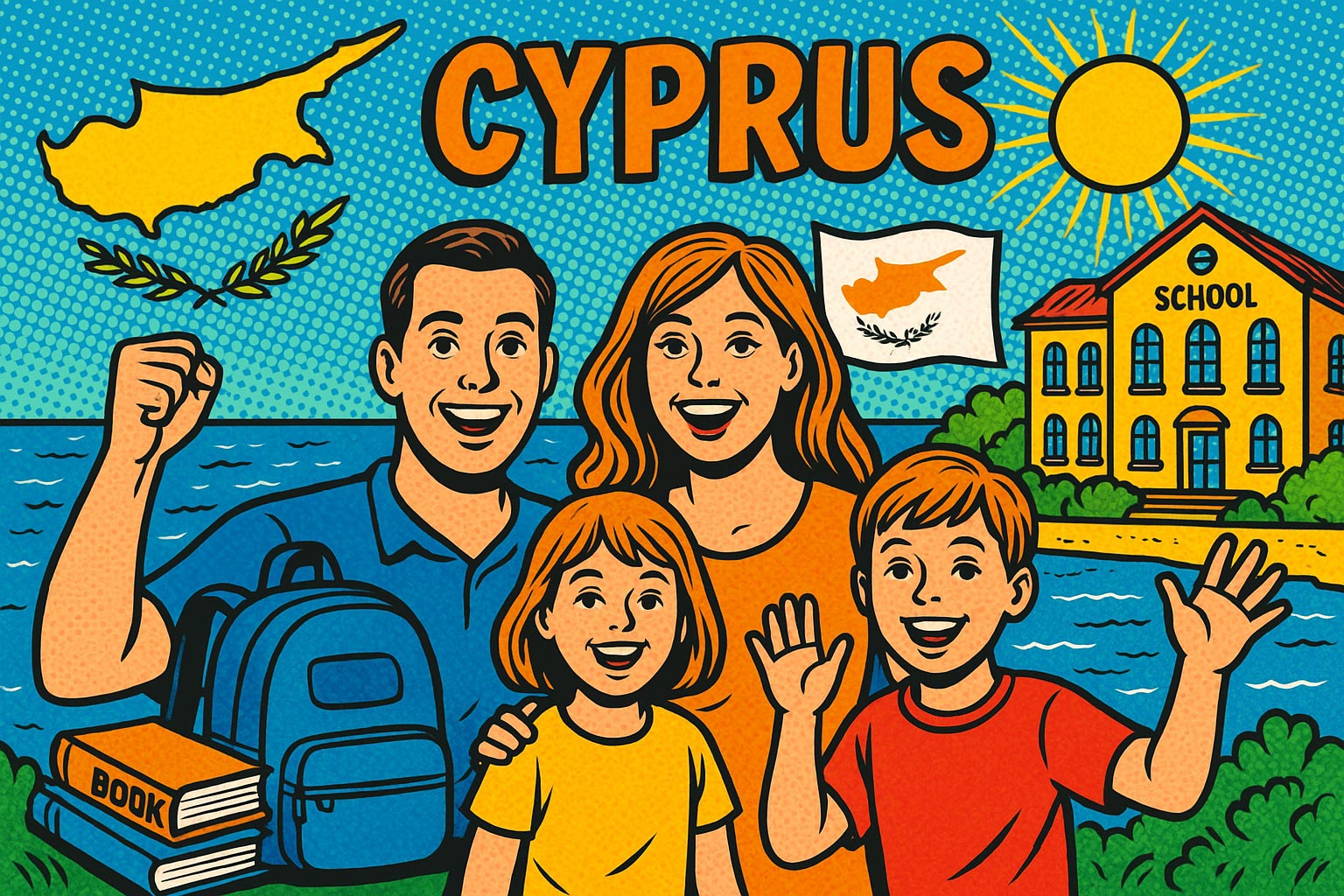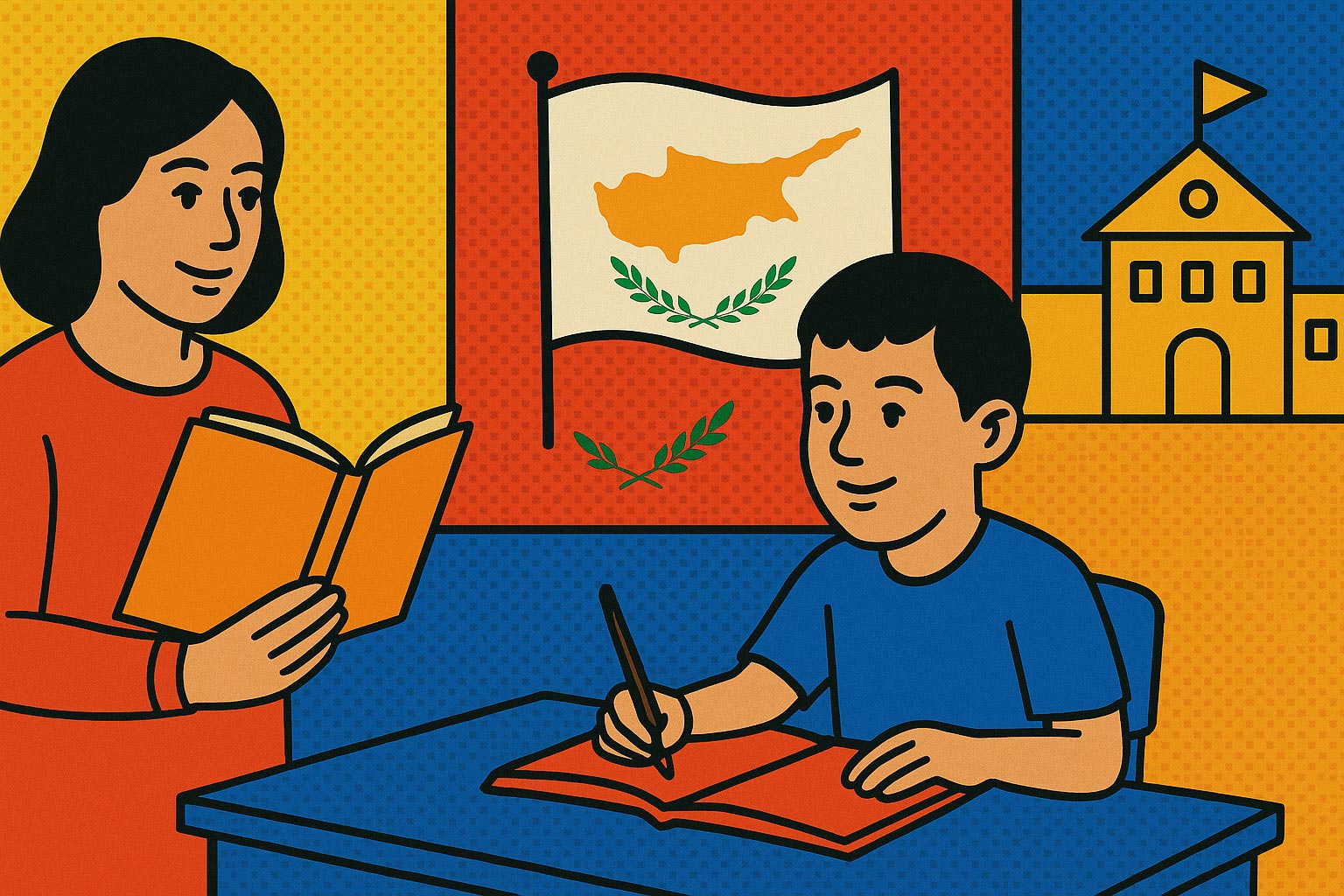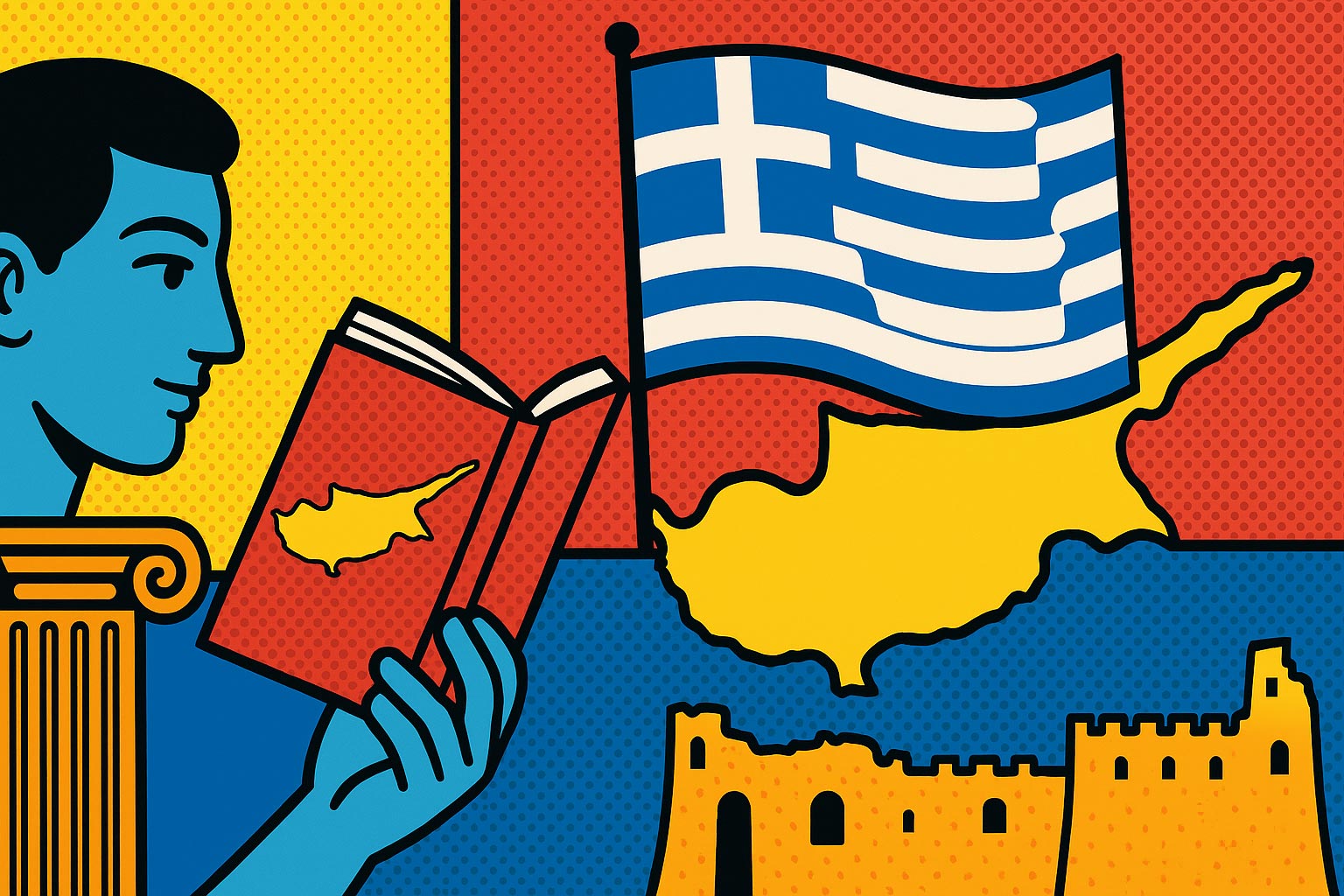- 1. Why More Families Are Choosing Cyprus
- 2. Understanding the Cypriot Education System at a Glance
- 3. Kindergartens: Laying the Foundations
- 4. Choosing a Primary or Secondary School
- 5. Admission & Paperwork Made Simple
- 6. Helping Children Adapt Academically and Socially
- 7. Life Beyond the Classroom
- 8. Practical To-Do List for a Smooth Start
- 9. Your Mediterranean Chapter Begins Here
- 10. FAQ: Common Questions About Moving to Cyprus with Children
Relocating to a new country is always a significant life change, but moving to Cyprus with children brings its own unique set of considerations. The Mediterranean island has become increasingly popular among expat families seeking year-round sunshine, outstanding safety records, and vibrant international communities. This comprehensive guide aims to demystify the process of finding schools in Cyprus for expats, navigating local kindergartens, and ensuring your children’s smooth adaptation to their new island home. With proper preparation, your family’s Mediterranean adventure can begin with confidence rather than confusion.
Why More Families Are Choosing Cyprus
Cyprus has evolved from a holiday destination to a prime relocation spot for families worldwide. The reasons extend far beyond its stunning beaches and historical sites. The island offers an exceptional quality of life that balances modern European amenities with Mediterranean hospitality.
Healthcare in Cyprus ranks among the strongest in the region, with both public and private options available to residents. The public healthcare system, GESY, covers children’s basic medical needs, while numerous private pediatric specialists serve the expat community. Crime rates remain remarkably low—Cyprus consistently ranks among the safest countries in Europe, allowing children the freedom to play outdoors that might be restricted in larger metropolitan areas.
The climate provides another compelling draw: with over 300 sunny days annually, children can enjoy outdoor play almost year-round. This weather facilitates a more active lifestyle and numerous opportunities for weekend family adventures. For parents, Cyprus offers significant tax incentives for new residents, including reduced income tax rates and non-domicile benefits that can substantially lower the cost of living compared to Western European countries.
Notable benefit: The widespread use of English in Cyprus significantly eases the adaptation process for many expat children. While Greek is the official language, English functions as a de facto second language in business, tourism, and education—meaning children can often begin school without immediate language barriers.
Understanding the Cypriot Education System at a Glance
Before diving into specific institutions, it’s important to grasp the overall structure of education in Cyprus. The system combines elements of both British and Greek educational models, creating a unique hybrid that serves its multicultural population.
| Tier | Main Language(s) | Typical Age Range & Notes |
|---|---|---|
| Pre-primary (Kindergarten) | Greek / English | 3 – 5 yrs; mix of private & public kindergartens Cyprus |
| Primary School | Greek / English | 6 – 11 yrs; public free, many bilingual options |
| Secondary (Gymnasium & Lyceum) / International | Greek / English / Russian etc. | 12 – 18 yrs; IGCSE & A-Level tracks available |
The academic year in Cyprus typically begins in early September and continues until late June, with breaks for Christmas, Easter, and various public holidays. The school week runs Monday through Friday, with the intensity of schooling increasing as students progress through the system.
Grading varies by institution type, but most follow either a numerical system (1-20, with 10 being a pass) or the international A-F format. For expat families, it’s worth noting that many Cypriot children attend “frontistirio” after regular school—these are private tutoring centers that provide additional support in subjects ranging from languages to mathematics and sciences. While not mandatory, they’re an integral part of the educational landscape, especially for older students preparing for university entrance exams.
Kindergartens: Laying the Foundations
Finding the right kindergarten forms a crucial first step in your child’s adaptation to Cyprus. The early education sector offers diverse options catering to various needs, philosophies, and budgets.
Types of Kindergartens Cyprus Offers
Public municipal kindergartens operate under the Ministry of Education and offer programs primarily in Greek. While the quality of education is generally good, these institutions rarely provide extensive support for non-Greek speakers, making them better suited for families planning long-term integration into Cypriot society.
Private local kindergartens often offer bilingual programs (Greek-English), creating a gentle introduction to both languages. These typically charge moderate fees compared to fully international options and may incorporate elements of Cypriot culture while maintaining accessible communication for expat children.
International kindergartens follow various curricula including British, American, and International Baccalaureate frameworks. Instruction occurs primarily in English (though some offer Russian, French or other languages), and they typically employ staff familiar with supporting children through cultural transitions. These command premium fees but provide the smoothest adjustment for many expat families.
Alternative approach kindergartens including Montessori, Waldorf-Steiner, and Reggio Emilia models have also established a presence in Cyprus, particularly in Limassol and Nicosia. These emphasize child-led learning and holistic development rather than structured academics at the early education stage.
How to Pick the Right One
Selecting the optimal kindergarten requires evaluating several key factors:
- Location & transport: Consider daily commute time, especially as traffic in Limassol and Nicosia can be challenging during morning rush hours
- Languages spoken by staff: Ensure at least some educators can communicate effectively with your child from day one
- Class size & pedagogy: Smaller groups typically offer more individualized attention during the adaptation period
- Tuition fees and hidden costs: Budget for additional expenses including uniforms, meals, and extracurricular activities
- Integration programme: Look for kindergartens that offer specific support for non-Greek speakers, including dedicated language assistants
“Early childhood education is the key to the betterment of society.”— Maria Montessori, whose educational philosophy has influenced several kindergartens in Cyprus
Choosing a Primary or Secondary School
As children progress beyond kindergarten, the educational options diversify further. Cyprus offers three main categories of schools, each with distinct advantages and considerations for expat families.
Public vs. Private vs. International
Public schools in Cyprus are free for all legal residents, including expat children. Instruction occurs primarily in Greek, though some schools in areas with large expat populations have begun offering additional support for non-Greek speakers. The curriculum follows the Greek Cypriot national standards with a focus on local history, language, and culture. While these schools provide excellent integration opportunities, they can present significant initial challenges for children without Greek language skills.
Private Cypriot schools charge tuition but often deliver bilingual education and smaller class sizes. These represent a middle ground between public and international options, offering some cultural immersion while maintaining sufficient English instruction to keep academics accessible. Many follow a hybrid curriculum incorporating elements of both Cypriot and international educational standards.
International schools follow foreign or international curricula (British, American, IB, etc.) with instruction predominantly in English. These schools typically maintain high academic standards and seamless pathways to universities worldwide. Class sizes average 15-20 students, and facilities often include state-of-the-art technology, extensive sports amenities, and specialized learning support services. Annual tuition ranges from €8,000 to €20,000 depending on the institution and grade level.
Key Questions to Ask on a School Tour
- What language support do you provide for non-Greek speaking students?
- How do you handle cultural adjustment issues and prevent isolation?
- What percentage of your student body comes from expatriate families?
- How do your examination results compare to national and international averages?
- What provisions do you make for students with learning differences or special educational needs?
- How do you communicate with parents about academic progress and behavioral concerns?
- What extracurricular activities are available to support well-rounded development?
- What universities or subsequent schools do your graduates typically attend?
Admission & Paperwork Made Simple
Navigating the administrative requirements for enrolling children in Cypriot educational institutions requires advance planning and document preparation. Understanding the process can significantly reduce stress during your relocation.
For non-EU citizens, children’s visa and residence permit requirements typically align with their parents’ status. You’ll need to demonstrate that your children are financially supported and will be enrolled in an approved educational institution. The Civil Registry and Migration Department (http://www.moi.gov.cy/moi/crmd/crmd.nsf/index_en/index_en) handles these procedures, and it’s advisable to initiate the process well before your planned move.
Health documentation proves particularly important for school enrollment. Cyprus requires a comprehensive health certificate including vaccination records aligned with the European immunization schedule. Key vaccinations include MMR, DTP, polio, hepatitis B, and varicella. The Ministry of Health (https://www.moh.gov.cy/moh/moh.nsf/index_en/index_en) provides detailed vaccination schedules and requirements.
Important: All official documents must be either in Greek or English. For documents in other languages, certified translations will be required, often with apostille certification depending on your country of origin.
Application timelines vary significantly between public and private institutions. Public schools typically have strict enrollment periods in spring for the following academic year. International and private schools often accept applications year-round, subject to availability, though many prestigious institutions maintain waiting lists for popular entry points.
Helping Children Adapt Academically and Socially
The transition to a new educational environment can challenge even the most resilient children. Proactive support measures can make the difference between a struggling start and a successful adaptation.
Language Support & Bridging Classes
The Cypriot government offers free Greek language courses for foreign residents through adult education centers in most communities. While primarily designed for adults, these resources can benefit older children and provide parents with vocabulary to assist younger learners. For more structured support, the Ministry of Education runs intensive Greek language programs in certain public schools with high concentrations of non-Greek speaking students.
International and many private schools offer English as a Second Language (ESL) programs for students who need to strengthen their academic English. These typically combine dedicated language classes with in-classroom support during subject lessons. Some schools also offer mother-tongue maintenance programs, recognizing the cognitive benefits of continued development in a child’s first language.
For families planning to integrate into the Greek-speaking system, consider arranging private Greek tutoring several months before relocation. Even basic communication skills can significantly reduce initial anxiety and accelerate classroom participation.
Cultural Adaptation Strategies
Many Cyprus schools implement buddy systems pairing new arrivals with established students who share similar interests or language backgrounds. These relationships provide practical guidance and social connections during the crucial first weeks.
Parent-teacher associations often organize welcome events and family activities that help newcomers build community connections. Actively participating in these networks can provide valuable insights into local educational expectations and social norms while expanding your family’s support system.
Encouraging participation in local festivals and traditions offers experiential cultural learning opportunities. Cyprus maintains a rich calendar of events including religious celebrations, harvest festivals, and historical commemorations. These occasions provide natural contexts for understanding Cypriot values and building cross-cultural friendships.
“The greatest sign of success for a teacher is to be able to say, ‘The children are now working as if I did not exist.'”— Maria Montessori, educational philosophy followed by several schools in Cyprus
Life Beyond the Classroom
Education extends far beyond formal schooling, especially when relocating to a culturally rich environment like Cyprus. The island offers abundant opportunities for holistic development through organized activities and natural exploration.
After-school clubs and activities flourish across Cyprus, with particularly strong offerings in sports (swimming, tennis, football), performing arts (traditional dance, music, drama), and increasingly, technology (coding, robotics). While some schools provide comprehensive extracurricular programs, many Cypriot children participate in municipal programs or private academies specializing in specific disciplines. The Cyprus Sports Organization (https://cyprussports.org/) maintains facilities nationwide and organizes youth leagues in various sports.
Weekend exploration provides informal learning opportunities that complement classroom education. Cyprus compresses diverse landscapes into a manageable area, allowing families to explore beaches, mountains, forests, and archaeological sites within short driving distances. The Cyprus Tourism Organization (https://www.visitcyprus.com) publishes family-friendly itineraries that combine educational value with outdoor adventure.
Support networks play a crucial role in successful adaptation. Numerous Facebook groups cater to expat families in specific regions of Cyprus, offering everything from secondhand school uniforms to playdate coordination. Popular groups include “Expat Families in Cyprus,” “Parents in Limassol,” and “Nicosia Mums.” Additionally, several relocation consultants specialize in family transitions, offering services ranging from school selection to social integration support.
Practical To-Do List for a Smooth Start
- Research catchment areas and commute times – Identify viable neighborhoods based on school locations and transportation options before committing to housing.
- Collect and translate academic records – Gather report cards, standardized test results, and any special educational assessments; arrange certified translations if originals aren’t in English or Greek.
- Secure long-term rental near chosen school – Prioritize proximity to reduce daily commuting stress, especially important during the adaptation period.
- Schedule health check-ups and update vaccinations – Ensure compliance with Cypriot health requirements and obtain properly formatted documentation.
- Initiate school applications – Submit documentation to multiple institutions if possible to maximize options.
- Arrange language preparation – Begin basic Greek lessons (even informal exposure through apps or videos) before arrival.
- Join relevant social media groups – Connect with current school parents to gain insights and begin building your support network.
- Create a visual countdown calendar – Help children visualize the transition timeline while emphasizing exciting aspects of the move.
- Prepare a comfort package – Assemble familiar items (photos, special toys) that will accompany your child on the first school days.
- Plan a school orientation visit – Arrange to tour the facility before the official first day to reduce anxiety about the unknown.
Your Mediterranean Chapter Begins Here
Moving to Cyprus with children represents not just a change of location but an opportunity for educational and personal enrichment that few other destinations can match. With thoughtful preparation, the island’s diverse educational landscape can accommodate virtually any family’s needs and preferences, whether you’re seeking full cultural immersion or continuity with international standards.
The open-air Mediterranean lifestyle naturally complements formal education, providing children with year-round opportunities to explore, exercise, and experience history in ways that textbooks alone cannot deliver. Many expatriate families report that their children develop increased independence, improved language acquisition, and enhanced cultural intelligence after relocating to Cyprus.
To maximize your family’s chances of a seamless transition, begin contacting potential schools at least six months before your planned relocation—particularly if you’re targeting popular international institutions where waiting lists can extend over a year for certain grade levels. The early application period also allows time for document processing, housing arrangements aligned with school location, and the emotional preparation children need before such a significant life change.
With the right foundation and support, your children won’t merely adjust to life in Cyprus—they’ll thrive in their new Mediterranean home.
FAQ: Common Questions About Moving to Cyprus with Children
1. How far in advance should I apply to an international school in Cyprus?
For the most sought-after international schools, especially in Limassol and Nicosia, applications should be submitted 9-12 months before your planned start date. Popular entry points (Reception, Year 7, Year 12) often have waiting lists, while mid-year transfers depend entirely on space availability. Even less competitive schools recommend applying at least one term in advance to allow for document processing and assessment procedures.
2. Are public schools free for non-EU expat families?
Yes, public schools in Cyprus are free for all legal residents regardless of nationality, provided you have the proper residence permits. This includes access to the standard curriculum, basic materials, and regular school activities. However, you’ll still need to budget for uniforms, some supplies, and optional extras like school trips or special programs.
3. Do children need to speak Greek before enrolment?
For international and most private schools, Greek language skills are not required as the primary instruction is in English or other languages. For public schools, while there’s no formal Greek proficiency requirement for enrollment, children without Greek language skills will face significant initial challenges. Many public schools now offer additional language support, but the core curriculum remains Greek-based.
4. How does school transportation work on the island?
Most international and private schools operate dedicated bus services covering major residential areas, with costs ranging from €700-1,500 annually depending on distance. Public schools don’t typically provide transportation except in rural areas. In cities, public bus networks serve school routes, though service frequency and reliability vary by region. Many expat families arrange carpools or private transportation, especially during the initial settlement period.
5. Are there special education services in English?
International schools typically offer the most comprehensive English-language special education services, including support for specific learning difficulties, speech therapy, and individualized education plans. These services often incur additional fees beyond standard tuition. Some private schools provide limited learning support in English, while public school special education services operate almost exclusively in Greek.
6. How long is the school day, and is lunch provided?
School hours vary by institution type. Public schools typically run from 7:30 AM to 1:35 PM with no formal lunch period (students bring snacks for breaks). Most private and international schools operate longer days, from approximately 8:00 AM to 3:00 PM, with dedicated lunch periods. Some schools offer optional afternoon programs extending until 5:00 PM. Lunch provisions vary—some schools have cafeterias serving hot meals, while others require packed lunches from home.
7. Which documents must be apostilled for school registration?
Documents requiring apostille certification typically include birth certificates, previous school transcripts, health records including vaccination history, and in some cases, parents’ marriage certificates. The specific requirements vary based on your country of origin and the school’s policies. EU-country documents generally need fewer certifications than those from non-EU countries.
8. What vaccination schedule is recognized by Cypriot schools?
Cypriot schools follow the European immunization schedule. Required vaccinations include diphtheria, tetanus, pertussis, polio, Hib, hepatitis B, measles, mumps, rubella, and varicella. HPV vaccination is recommended but not mandatory. Schools typically require a health certificate completed by a physician confirming all age-appropriate vaccinations have been administered according to schedule.


